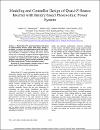A Quasi -Oppositional Method for Output Tracking Control by Swarm -Based MPID Controller on AC/HVDC Interconnected Systems with Virtual Inertia Emulation
| Author | Naveh, Iman M. Hosseini |
| Author | Rakhshani, Elyas |
| Author | Mehrjerdi, Hasan |
| Author | Elsaharty, Mohamed A. |
| Available date | 2022-11-14T10:49:08Z |
| Publication Date | 2021 |
| Publication Name | IEEE Access |
| Resource | Scopus |
| Resource | 2-s2.0-85107196468 |
| Abstract | This paper presents a comprehensive evaluation of the effect of quasi oppositional -based learning method utilization in output tracking control through a swarm-based multivariable Proportional-Integral-Derivative (SMPID) controller, which is tuned by a novel performance index based on the step response characteristics in multi-input multi-output (MIMO) system. The role of the proposed quasi oppositional based SMPID controller is to modify the tracking strategy on AC/HVDC interconnected systems while reducing the related cost function. The proposed analysis is established considering the most highly cited, well-known tested and newly expanded swarm-based optimization algorithms (SBOAs), such as Grasshopper Optimization Algorithm (GOA), Grey Wolf Optimization (GWO), Artificial Fish Swarm Algorithm (AFSA), Artificial Bee Colony (ABC) and Particle Swarm Optimization (PSO). These methods are used in the tuning process of multivariable PID (MPID) controller for output tracking control of an interconnected AC/DC system with virtual inertia emulation-based HVDC capabilities. The virtual inertia-based HVDC model, which is using a derivative technique, is attached for enhancing the system frequency dynamics with fast power injection during the contingency. The potential possibility for achieving a suitable assessment about the velocity reaction, the flexibility response, and the accuracy of the tracking process is provided by four different scenarios which are operated by step load changes as essential inputs in AC/HVDC interconnected MIMO system. Also the proposed fitness function, as deviation characteristics of the step response in MIMO transfer function in virtual inertia emulation based HVDC model, is compared with integral time absolute error (ITAE), as the standard performance index in the optimization process. The results are compared with the conventional tuned MPID (C - MPID) controller using MATLAB software. The obtained analysis emphasizes how the tuned SMPID can significantly increase the capability of tracking control on the proposed AC/HVDC interconnected model. CCBY |
| Language | en |
| Publisher | Institute of Electrical and Electronics Engineers Inc. |
| Subject | AC/HVDC interconnected system with energy storage systems (AC/HVDC with ESS) Artificial Bee Colony (ABC) Artificial Fish Swarm Algorithm (AFSA) Conventional tuned MPID (C - MPID) Emulation Frequency control Grasshopper Algorithm (GOA) Grey Wolf Optimization (GWO) algorithm HVDC transmission Interconnected systems MIMO communication Multivariable Proportional– Integral– Derivative (MPID) controller Optimization Particle Swarm Optimization (PSO) Power system stability Quasi Oppositional - based ACO (QOACO) Quasi Oppositional - based AFSA (QOAFSA) Quasi Oppositional - based GOA (QOGOA) Quasi Oppositional - based GWO (QOGWO) Quasi Oppositional - based learning method (QO) Quasi Oppositional - based PSO (QOPSO) Swarm– based MPID Controller (SMPID) Swarm– based Optimization Algorithms (SBOAs) Tuning Virtual inertia |
| Type | Article |
Files in this item
This item appears in the following Collection(s)
-
Electrical Engineering [2424 items ]


